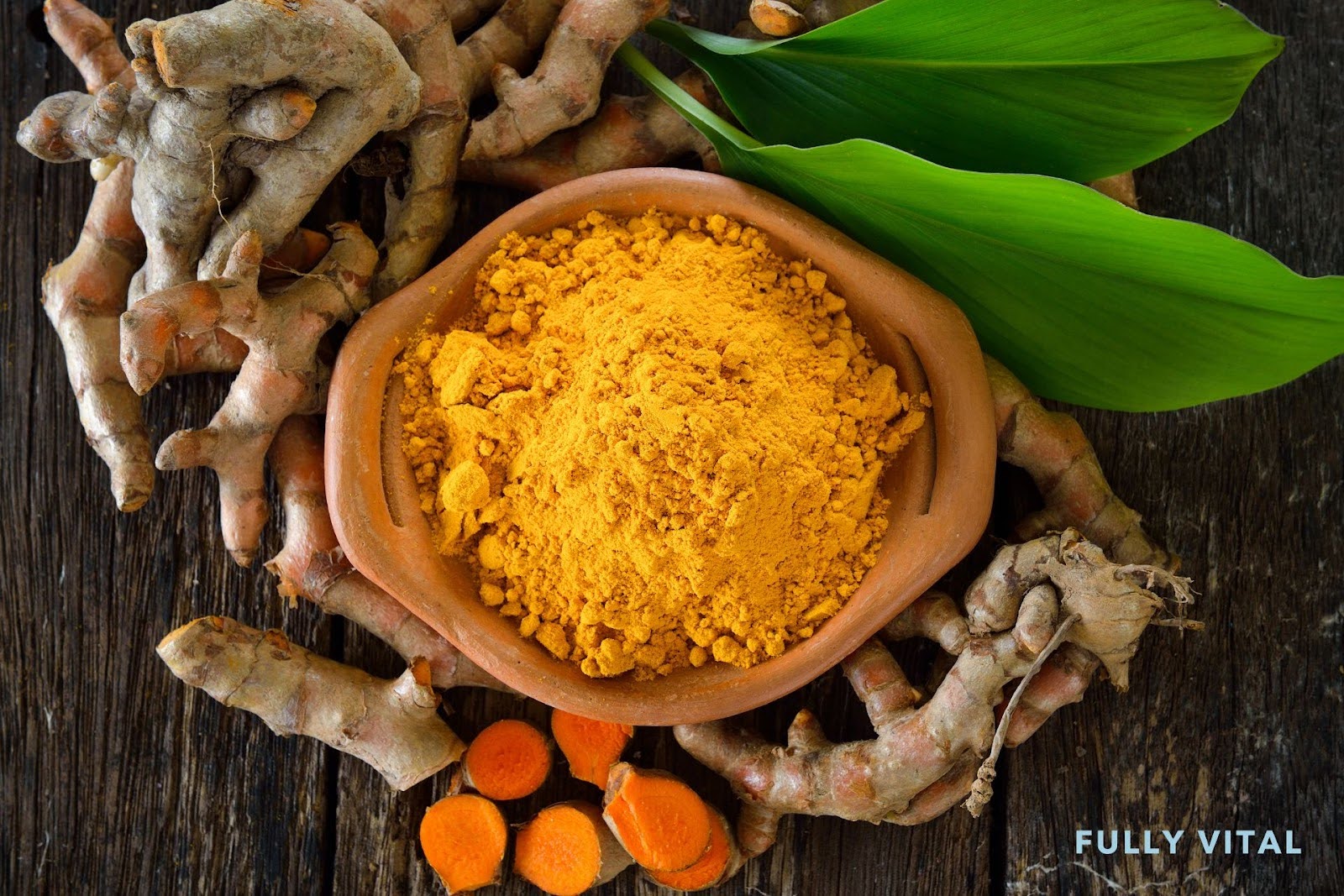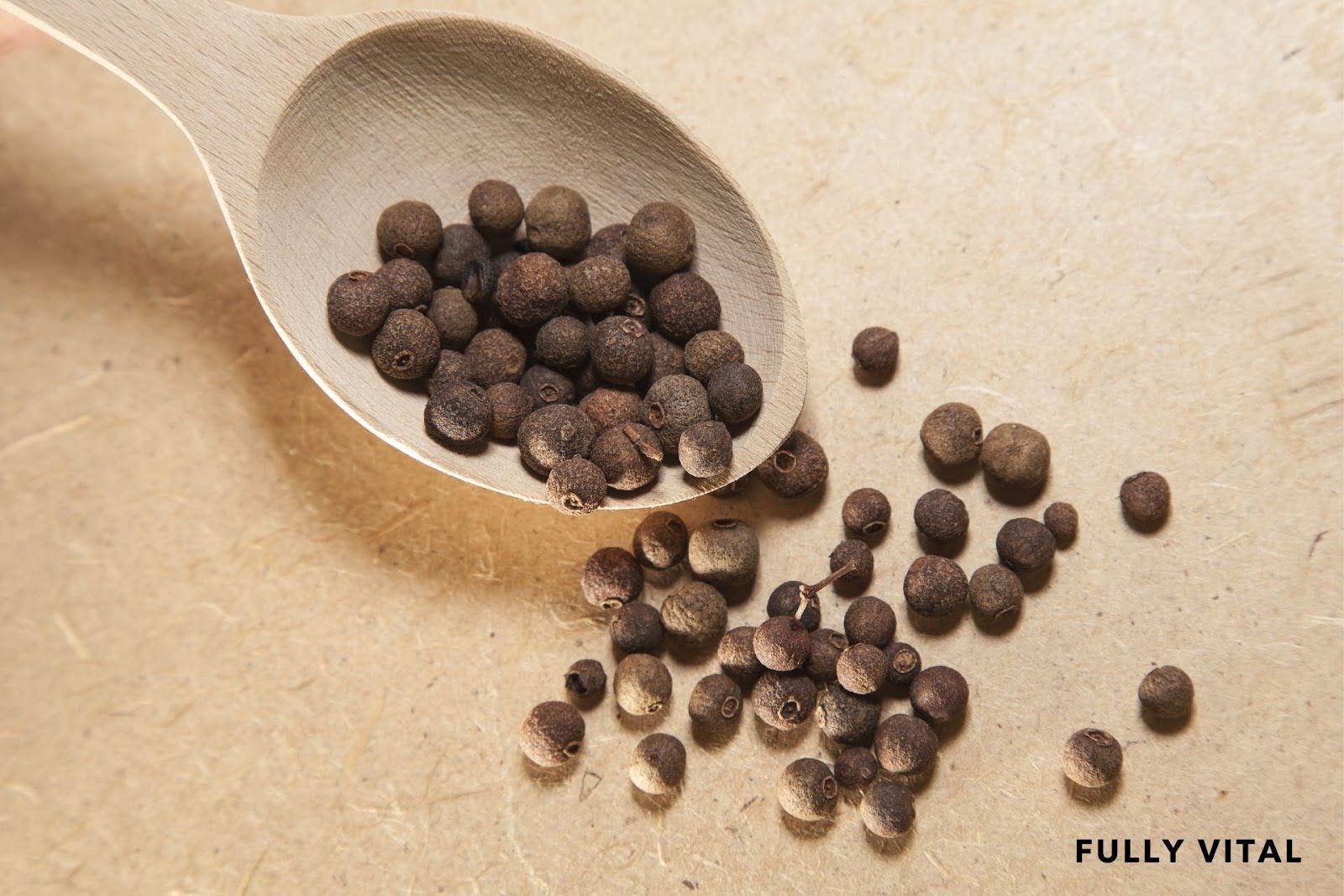
Turmeric: The Golden Spice For Scalp Health
Maintaining scalp health is crucial for both the appearance and overall health of your hair.
An unhealthy scalp can lead to a range of issues, from dandruff and irritation to inhibited hair growth.
In the search for natural remedies to support scalp wellness, turmeric emerges as a potent solution.
Known as the "Golden Spice," turmeric is celebrated for its anti-inflammatory, antimicrobial, and antioxidant properties, which can offer a myriad of benefits for scalp health.
This article delves into how turmeric can be an effective natural treatment for various scalp conditions, the best methods for its application, and the scientific evidence supporting its use.
By exploring turmeric's role in scalp care, we aim to provide valuable insights for anyone looking to enhance their hair health through natural means.

I LOVE MY HAIR NOW
FullyVital hair serum and hair vitamins made tremendous improvements in my hair. I truly love my hair now.
Shop Hair ProductsWhat Is Turmeric?
Turmeric, known scientifically as Curcuma longa, is part of the ginger family, native to the Indian subcontinent and Southeast Asia.
Its ground root yields a yellow-orange powder, celebrated not only for its culinary uses but also for its medicinal and cosmetic benefits.
The spice's health properties are primarily attributed to curcumin, its main active compound, which is an antioxidant with potent anti-inflammatory and antimicrobial effects.
Traditionally used in Ayurveda and Chinese medicine, turmeric has a long history of treating various conditions, including skin and digestive issues.
Its application in hair and scalp care is derived from these broad medicinal uses, offering benefits like a healthier scalp through its natural healing properties.
What Makes Turmeric Beneficial For Scalp Health?
Turmeric's benefits for scalp health primarily stem from curcumin, which possesses strong anti-inflammatory, antimicrobial, and antioxidant properties.
These characteristics are key in addressing common scalp issues:
Anti-Inflammatory Properties
Curcumin effectively reduces inflammation, which can alleviate scalp conditions like psoriasis and dermatitis, leading to a healthier scalp environment conducive to hair growth.
Antimicrobial Effects
Its antimicrobial properties help combat dandruff and other scalp infections by inhibiting the growth of bacteria and fungi, maintaining a clean and healthy scalp.
Antioxidant Capacity
Turmeric's antioxidants protect the scalp and hair follicles from damage caused by free radicals, potentially preventing hair loss and promoting overall scalp health.
How Can Turmeric Improve Your Scalp Condition?
Combating Dandruff
Turmeric's antimicrobial and anti-inflammatory qualities make it effective against dandruff.
By reducing scalp inflammation and fighting the fungi that contribute to dandruff, it helps soothe irritation and lessen flake formation.
Reducing Scalp Inflammation
Conditions like psoriasis and seborrheic dermatitis result in scalp inflammation.
Turmeric, with its potent anti-inflammatory effects, can alleviate these symptoms, providing relief and reducing redness and itching.
Promoting Healthy Hair Growth
The antioxidant properties of turmeric protect the hair follicles from damage and stress, fostering a healthier growth environment.
Moreover, its ability to improve circulation in the scalp may further encourage hair growth by ensuring that hair follicles are well-nourished.
What Are The Best Ways To Use Turmeric For Scalp Health?
Turmeric Masks For Scalp Treatment
Creating a turmeric mask by mixing turmeric powder with ingredients like coconut oil or yogurt can help address scalp issues directly.
Apply the mixture to the scalp, leave it on for about 30 minutes, then rinse thoroughly.
This treatment can reduce dandruff, soothe irritation, and promote a healthy scalp.
Turmeric-Infused Hair Oils
Infusing hair oil with turmeric enhances its benefits, offering a convenient way to apply turmeric's healing properties.
Massage the turmeric-infused oil into the scalp before washing as part of a regular hair care routine.
This method aids in reducing inflammation and stimulating hair growth.
Dietary Turmeric For Overall Wellness
Incorporating turmeric into your diet can also contribute to scalp health from the inside out.
The anti-inflammatory and antioxidant benefits of turmeric can support overall wellness, indirectly benefiting the scalp and hair health.

Are There Any Side Effects To Using Turmeric On Your Scalp?
Possible Skin Reactions
Some individuals may experience skin irritation or allergic reactions to turmeric.
It's advisable to perform a patch test on a small area of the skin before applying it broadly to the scalp.
Staining Issues
Turmeric is known for its deep, vibrant color, which can stain skin and fabrics.
While any skin discoloration typically washes off, it's important to protect clothing and use old towels when applying turmeric treatments.
Can Turmeric Be Used Alongside Other Natural Remedies?
Turmeric can be effectively combined with other natural ingredients to enhance its benefits for scalp health.
Here are some complementary natural remedies:
Complementary Natural Ingredients
- Aloe Vera: Known for its soothing properties, aloe vera can be mixed with turmeric to calm scalp irritation and moisturize.
- Tea Tree Oil: With strong antimicrobial properties, tea tree oil can boost the dandruff-fighting power of turmeric.
- Coconut Oil: Combining turmeric with coconut oil can improve the mixture's ability to reduce inflammation and nourish the scalp.
Tips For Creating A Holistic Hair Care Routine
Integrating turmeric and these complementary ingredients into a holistic routine can address various scalp issues more comprehensively.
Experimenting with different combinations and treatments allows you to find a personalized approach that targets your specific concerns, enhancing overall scalp and hair health.

What Scientific Evidence Supports The Use Of Turmeric For Scalp Health?
Scientific research backs the efficacy of turmeric in promoting scalp and hair health, mainly through studies on curcumin, its active component.
These studies highlight:
- Anti-inflammatory and Antimicrobial Properties: Research demonstrates curcumin's ability to significantly reduce inflammation and combat microbial infections, making it beneficial for treating scalp conditions like dandruff and dermatitis.
- Antioxidant Effects: Studies indicate that curcumin's antioxidant properties can protect hair follicles from environmental stressors, potentially preventing hair loss.
- Promotion of Hair Growth: Preliminary research suggests that turmeric may help in promoting hair growth by extending the anagen phase (growth phase) of the hair cycle, although more targeted studies are needed to fully understand this effect.
How Does Turmeric Compare To Traditional Hair Care Products?
Turmeric offers a natural alternative to traditional hair care products, with distinct benefits and limitations:
Benefits
- Natural and Safe: Turmeric is a natural ingredient with fewer side effects compared to chemical-based products.
- Holistic Treatment: It addresses the root causes of scalp issues, such as inflammation and microbial infections, rather than just symptoms.
- Additional Health Benefits: Beyond scalp health, turmeric supports overall wellness thanks to its anti-inflammatory and antioxidant properties.
Limitations
- Slower Results: Natural remedies like turmeric may take longer to show results compared to conventional treatments.
- Inconvenience: Preparing and applying turmeric treatments can be more time-consuming and messy due to staining.
Despite these limitations, turmeric is an appealing option for those prioritizing natural, holistic approaches to scalp and hair care, offering a balance between efficacy and safety.
Experience Rejuvenated, Luminous Hair With Fully VitalRevamp your hair care approach with Fully Vital's innovative solutions, crafted to address the challenges of hair aging head-on. Our hair rejuvenation products are thoughtfully designed with the vitality of your hair as the priority, guiding you towards revitalizing your strands. Here are the reasons Fully Vital stands out for a nurturing hair care experience:
Discover the pathway to a voluminous, healthier head of hair today. Begin your journey to achieving the luxurious hair you've always wanted. With Fully Vital, timeless hair isn't just a fantasy—it's within reach. |
Final Thoughts On Turmeric
Turmeric, with its rich history in traditional medicine, has emerged as a potent natural remedy for enhancing scalp health.
Its anti-inflammatory, antimicrobial, and antioxidant properties offer a holistic approach to treating common scalp issues, such as dandruff, inflammation, and hair loss.
While incorporating turmeric into your hair care routine can provide numerous benefits, it's important to be aware of potential side effects, such as skin irritation and staining.
The effectiveness of turmeric, alongside its comparison with traditional hair care products, highlights its value as a natural, safe alternative for those seeking to improve their scalp health and overall hair wellness.
As with any natural remedy, patience and consistency are key to seeing results.
For those interested in integrating turmeric into their hair care regimen, a variety of turmeric-based products are readily available, offering a convenient way to harness the spice's benefits.
Ultimately, turmeric stands out as a versatile, effective ingredient for supporting scalp health and promoting healthy hair growth, embodying a fusion of traditional wisdom and modern science.
For those looking to boost their hair care regimen further, consider Fully Vital's Enhance Hair Serum (3-Pack).
Specially formulated to complement natural remedies, this serum offers an easy and effective way to support your journey towards healthier, more vibrant hair.
Read Also:
- The Root Cause Of Scalp Inflammation: Understanding The Triggers And Treatment Options
- Fully Vital Or Mielle Organics: Which Leads The Way In Hair Health?
- Tula Vs. Fully Vital: Unraveling The Best Hair Vitamin Secrets
Frequently Asked Questions About Turmeric
Is turmeric good for all scalp types?
Yes, turmeric can benefit all scalp types due to its anti-inflammatory and antimicrobial properties.
However, those with sensitive skin should do a patch test first.
Can turmeric help with hair thinning?
While more research is needed, turmeric's antioxidant properties may help protect hair follicles and promote a healthier growth environment, potentially aiding in hair thickness.
How often should I use a turmeric treatment on my scalp?
For best results, turmeric treatments can be used 1-2 times a week.
Adjust frequency based on your scalp's tolerance and the condition being treated.
Will turmeric stain my hair?
Turmeric can stain fabrics, but it's unlikely to change the color of your hair significantly.
However, those with very light hair should use it cautiously and rinse well.
Can I use turmeric if I have a scalp wound?
Turmeric has wound-healing properties, but it's best to consult a healthcare provider before applying it directly to open wounds.
Does consuming turmeric orally benefit scalp health as well?
Yes, consuming turmeric can offer systemic anti-inflammatory and antioxidant benefits, which may indirectly benefit scalp health.
Can turmeric treatments replace my dandruff shampoo?
Turmeric can complement dandruff treatments by addressing inflammation and microbial growth, but it may not replace medicated shampoos for severe cases.
How do I remove turmeric stains from my skin or bathroom?
Baking soda mixed with water can be an effective paste for removing turmeric stains from skin, and bleach or hydrogen peroxide can help clean stained surfaces.
Can I mix turmeric with my regular shampoo or conditioner?
Yes, you can mix a small amount of turmeric powder with your shampoo or conditioner to incorporate its benefits into your regular hair care routine.
Are there any interactions between turmeric and medications?
Turmeric can interact with certain medications, including blood thinners and diabetes medications, due to its blood-thinning and blood sugar-lowering effects.
Consult a healthcare provider if you're on medication.
Sources:
- Kumar, S., & Ijpsr. (2013). ETHNOPHARMACOLOGICAL PROPERTIES OF CURCUMA LONGA: A REVIEW. 4(1), 103–112. https://citeseerx.ist.psu.edu/document?repid=rep1&type=pdf&doi=b5401c680f9f102d3077cfe715dbac5cb26d6efa
- Sun, M., Deng, Y., Cao, X., Xiao, L., Ding, Q., Luo, F., Huang, P., Gao, Y., Liu, M., & Zhao, H. (2022). Effects of Natural Polyphenols on Skin and Hair Health: A Review. 27(22), 7832–7832. https://doi.org/10.3390/molecules27227832
- Natarelli, N., Gahoonia, N., & Sivamani, R. K. (2023). Integrative and Mechanistic Approach to the Hair Growth Cycle and Hair Loss. Journal of Clinical Medicine, 12(3), 893. https://doi.org/10.3390/jcm12030893







